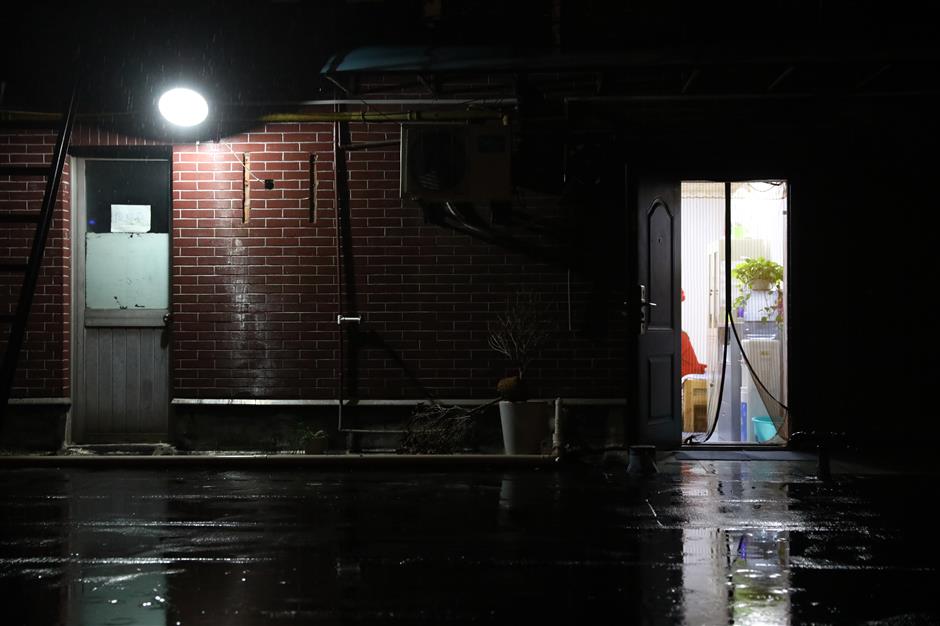At the end of the line, there is always Hope

Harvey Jiang takes a call at the Hope Line office. All Hope Line counselors are volunteers.
At 6pm last Friday Harvey Jiang and Minty Liu made their way up a quiet back alley hidden from the streetlights.
The pair, whose names have been changed, enter a building and head for the top floor. In a small office, they sit down and put on headsets. The telephones begin ringing almost immediately.
“Hope Line,” they say, almost in unison, as they pick up their calls.
Hope Line was set up to help people in distress, including those contemplating suicide. As the name suggests, the service is aimed at giving people hope. The hotline runs 24/7 nationwide. All volunteers who man the phones are certified psychological counselors.
“I think I have done something terribly wrong,” a voice on the line says. “I don’t know how to fix it. I’m at my wits’ end.”
“It is all right,” Jiang replies. “You did the best you could.”
The man on the phone starts to cry. After talking with Jiang for 30 minutes, he calms down. As Jiang hangs up, he heaves a sigh of relief. Then another call comes in.
During their four-hour shift, Jiang and Liu have hardly any time to talk to me.
“It is exhausting because you have to stay focused all the time,” says Jiang when he finally takes a short break at about 9:30pm. “If we say the wrong thing, we may do great harm to the person on the line.”
Jiang works for a consulting firm and volunteers at Hope Line twice a month.
“I got my counseling certificate in 2013, but there was no place for me to really help people until I found Hope Line,” he says.
The phone bank in Shanghai was established in 2012. Since then, Hope Line has spread across the country. Now with more than 30 centers, volunteers have handled more than 200,000 calls.

A volunteer takes a phone call.
In 2018, a Depression Line and Student Line were opened to meet high demand.
“It’s not an easy job,” said Liu, who began volunteering last year. “You have to go through a week of training and do a two-month trial.”
“People flinch when they hear that Hope Line is a completely voluntary campaign,” said Lisa Li, head of Hope Line Shanghai. “What we are doing here is not about money. People at their most vulnerable come to us for help. It is a great responsibility.”
The phone bank, is just a small room, with four desks and a tiny bed. At 10pm, Jiang and Liu finish their shifts. As they are packing up to leave, Yanny Fan comes in. She will work the 10pm-8am shift.
Fan lives in Taicang in Jiangsu Province. Every week she travels two hours to the office. It is her fourth year at the hotline. An education major, she had an interest in psychology that led to an internship at a hospital psychiatric unit.
She was part of the relief effort after the 2008 Sichuan earthquake.
“It was something one can never forget,” Fan said of the experience. “Everything was in ruins. People were in such shock that they couldn’t even cry.”
Fan became a full-time counselor when she returned to Jiangsu and started a practice in her hometown of Huai’an. She joined Hope Line in 2012.
She takes a bag of cookies and some bananas from her bag.
“We don’t usually bring hot food because you don’t know if you’ll have time to eat it before it gets cold,” she says, as she scans Jiang’s log.
“I’m checking to see if he received any calls above level five,” Fan says. Each call is graded according to seven levels of distress — from slightly depressed to suicidal.

Volunteers take phone calls.
Over the years Hope Line Shanghai has received 55 level seven calls. The call-backs found that all of the callers had backed off from the idea of taking their own lives.
Li also organizes volunteers to give talks in companies and schools about the importance of mental health. Nearly 1,000 public lectures have been delivered by these volunteers.
“Hope Line,” said Fan as she picks up a call. In the first three hours, she takes six calls. Some are cranks, but one makes her gasp.
“Why am I here?” a male caller asks. “I don’t think I can find a purpose in life.”
“Where are you now?” Fan asks, her voice still soft but her fists clenched. “Have you eaten anything recently? Please talk to me.”
The man tells her that he was mistreated at work and none of his family understands him. When Fan replies that she understands his pain, the man breaks down and eventually abandons talk of taking his own life.
“People call us for help, for a reason to continue,” says Fan. “Even if they don’t realize it themselves.”
Most callers just need someone to talk to. Although the volunteers show real empathy with callers, they are trained not to establish personal relationships.
“After you leave the office, you put all the calls behind you,” Jiang told me.
According to the World Health Organization, more than 800,000 people kill themselves every year. Most are preventable.
Jiang said that two of his friends in college killed themselves. Neither of them showed any signs of depression or even distress before their deaths.
“Sometimes there is pain that we simply cannot express to the people we hold most dear,” Jiang said. “But eventually we all need a way out.”

Hope Line's Shanghai office
The volunteers simply hope they make a difference.
“I’ve had people I have talked to call back simply to say thank you,” said Jiang. “That keeps me going.”
If you know anyone who is in distress or is thinking about suicide, please call Hope Line at 400-161-9995 for confidential support in Chinese. For English support, please call LifeLine Shanghai at 400-821-1215.











